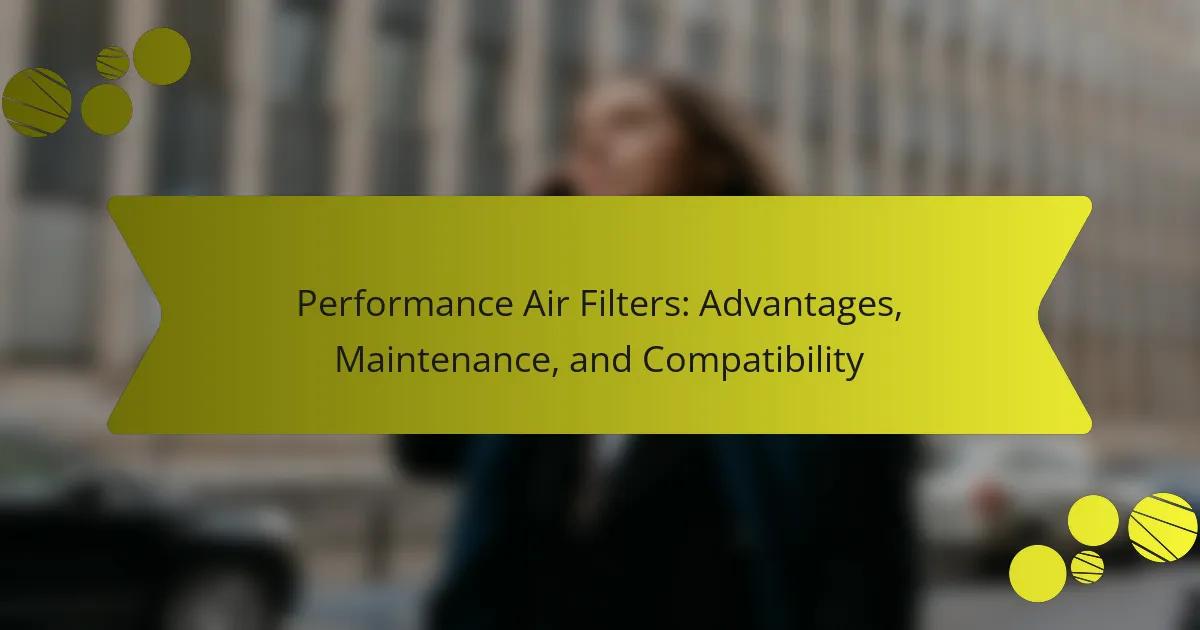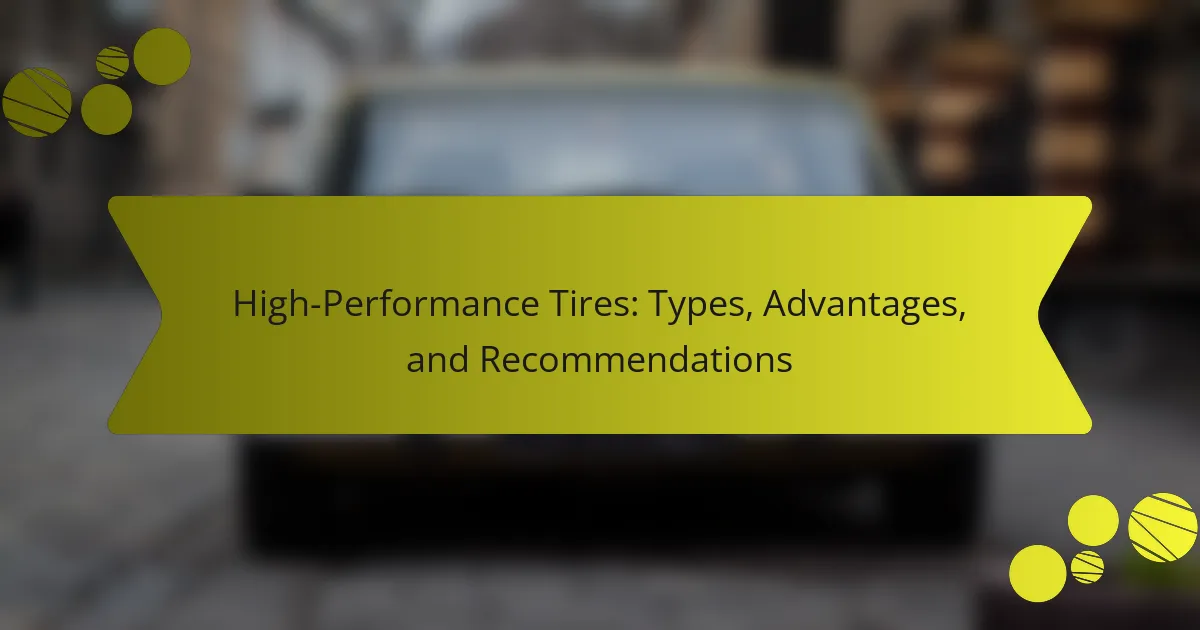Performance air filters enhance engine efficiency, improve horsepower, and increase fuel economy. This article explores the advantages of performance air filters, essential maintenance practices, and compatibility with various vehicle models. Discover the types of filters available and how they can optimize your vehicle’s performance. Understand common misconceptions to make informed choices for your automotive needs.
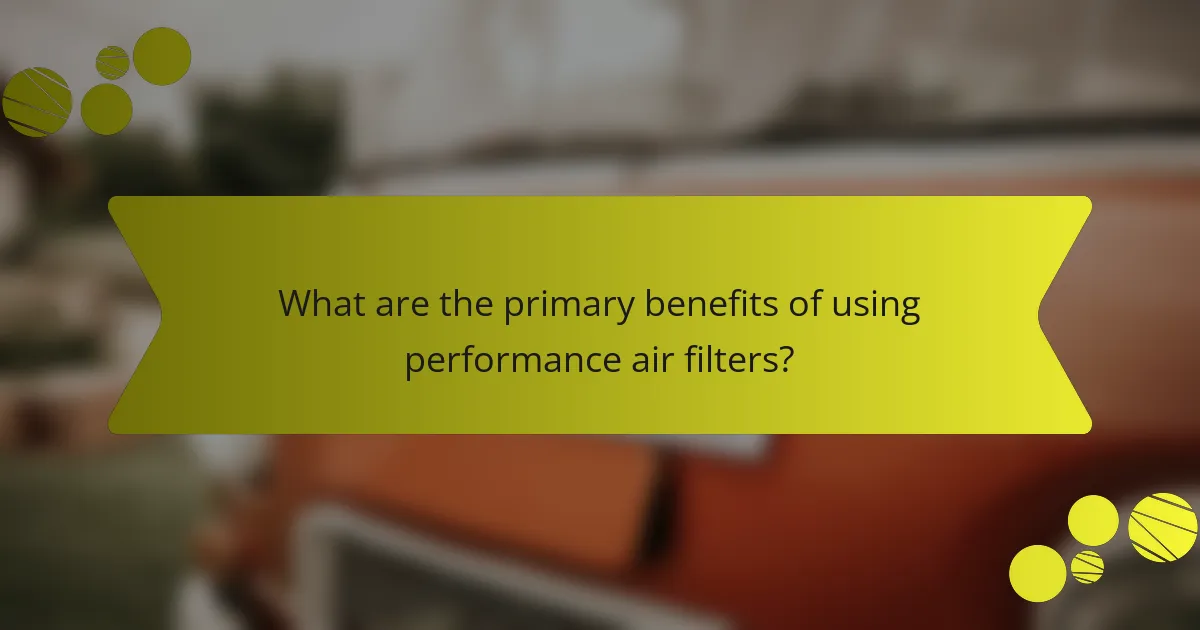
What are the primary benefits of using performance air filters?
Using performance air filters enhances engine efficiency, improves horsepower, and increases fuel economy. These filters provide superior filtration compared to standard options, allowing for better airflow and reduced engine strain. Regular maintenance of performance air filters can further optimize their benefits, ensuring longevity and consistent performance. Compatibility with various vehicle models makes them a versatile choice for automotive enthusiasts.
How do performance air filters enhance engine efficiency?
Performance air filters enhance engine efficiency by improving airflow and filtration. They allow more air into the engine, leading to better combustion and increased horsepower. This results in improved fuel economy and reduced emissions. Performance filters are often made from high-flow materials that trap dirt while maintaining optimal airflow, making them a unique upgrade for many vehicles. Regular maintenance, such as cleaning or replacing filters, is essential to sustain these benefits.
Why do performance air filters improve air quality?
Performance air filters improve air quality by enhancing filtration efficiency, removing more pollutants than standard filters. They capture microscopic particles, allergens, and contaminants, leading to cleaner air in vehicles and indoor environments. This results in better respiratory health and overall comfort. Performance filters often have a higher dust-holding capacity, requiring less frequent replacement, which is a unique advantage.
What impact do performance air filters have on fuel economy?
Performance air filters can improve fuel economy by enhancing airflow to the engine. This increased airflow allows for better combustion, which can lead to a more efficient fuel-to-air ratio. As a result, vehicles may experience a boost in miles per gallon, particularly in performance-oriented applications. Studies indicate that some drivers report fuel economy improvements of up to 10%. However, actual gains vary based on vehicle type and driving conditions. Regular maintenance of these filters is essential to sustain performance benefits.
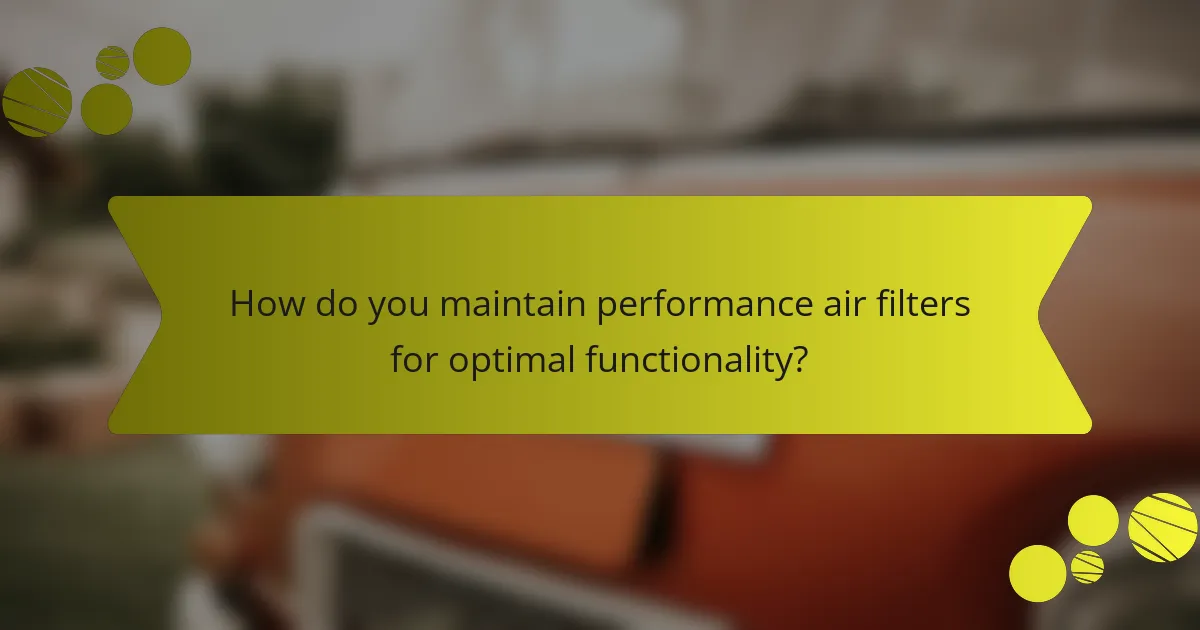
How do you maintain performance air filters for optimal functionality?
To maintain performance air filters for optimal functionality, regularly inspect and clean them. Replace filters according to manufacturer recommendations, typically every 12,000 to 15,000 miles or as needed. Ensure proper installation to prevent air leaks, which can reduce efficiency. Using the right type of filter for your vehicle enhances overall performance. Regular maintenance helps sustain airflow, improve engine efficiency, and prolong filter lifespan.
What are the recommended cleaning methods for performance air filters?
The recommended cleaning methods for performance air filters include gentle rinsing, vacuuming, and using specialized cleaning solutions. Rinsing with water removes dust and debris effectively. Vacuuming can help dislodge particles without damaging the filter. Specialized cleaning solutions enhance the cleaning process, ensuring optimal performance and longevity. Regular maintenance extends the filter’s lifespan and maintains engine efficiency.
How often should performance air filters be replaced?
Performance air filters should typically be replaced every 12,000 to 15,000 miles. This interval ensures optimal performance and efficiency. Factors such as driving conditions and filter type may influence replacement frequency. Regular checks can help maintain engine health and improve airflow.
What signs indicate that a performance air filter needs maintenance?
Performance air filters need maintenance when they show signs of reduced airflow, visible dirt accumulation, unusual engine sounds, or decreased performance. Regular checks can prevent engine strain and maintain optimal efficiency.
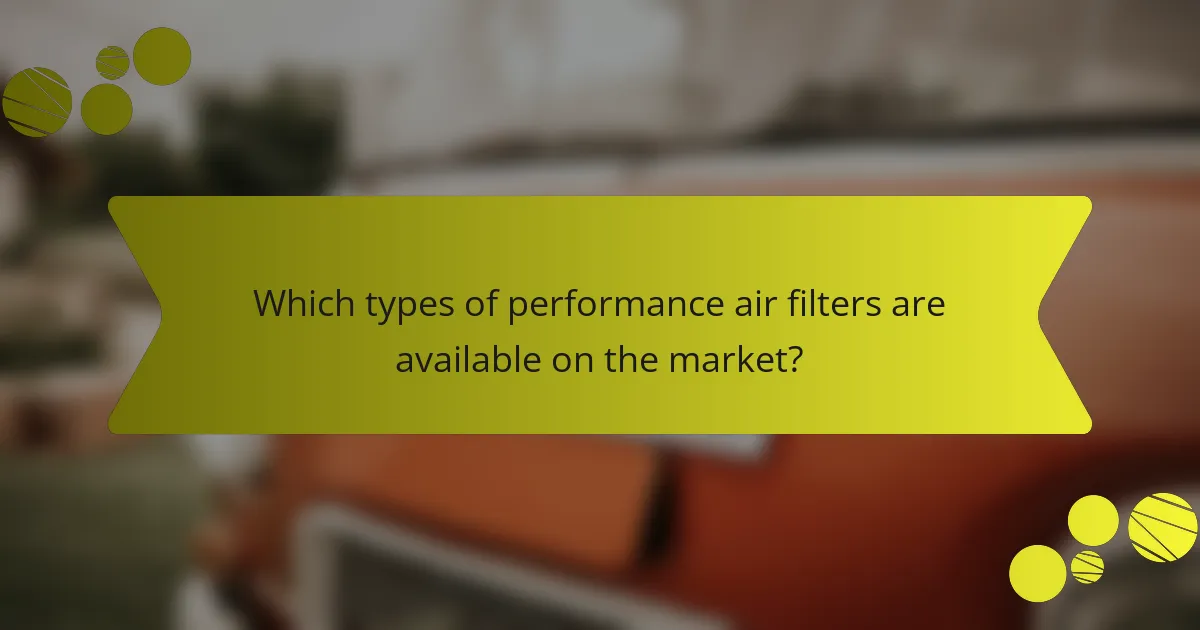
Which types of performance air filters are available on the market?
Performance air filters come in various types, including panel filters, cone filters, and foam filters. Panel filters are commonly used in factory air intakes, providing improved airflow and filtration. Cone filters often enhance performance in aftermarket applications, offering increased surface area for better air intake. Foam filters, known for their reusable nature, provide excellent filtration and are often used in off-road vehicles. Each type has unique attributes, such as varying levels of filtration efficiency and ease of maintenance, catering to different performance needs.
What differentiates reusable air filters from disposable ones?
Reusable air filters outperform disposable ones in longevity, cost-effectiveness, and environmental impact. Reusable filters can last several years, reducing waste and saving money over time. They often provide better filtration efficiency, capturing more particles than many disposable options. Maintenance involves cleaning, which is generally straightforward, while disposable filters require regular replacement.
Which brands are known for high-quality performance air filters?
Brands known for high-quality performance air filters include K&N, AEM, Spectre, and Airaid. These brands are recognized for their superior filtration efficiency and enhanced airflow. K&N offers washable filters with high dirt-holding capacity, while AEM specializes in synthetic filters that provide excellent performance. Spectre is known for affordable options without compromising quality, and Airaid features filters designed for specific vehicle applications.
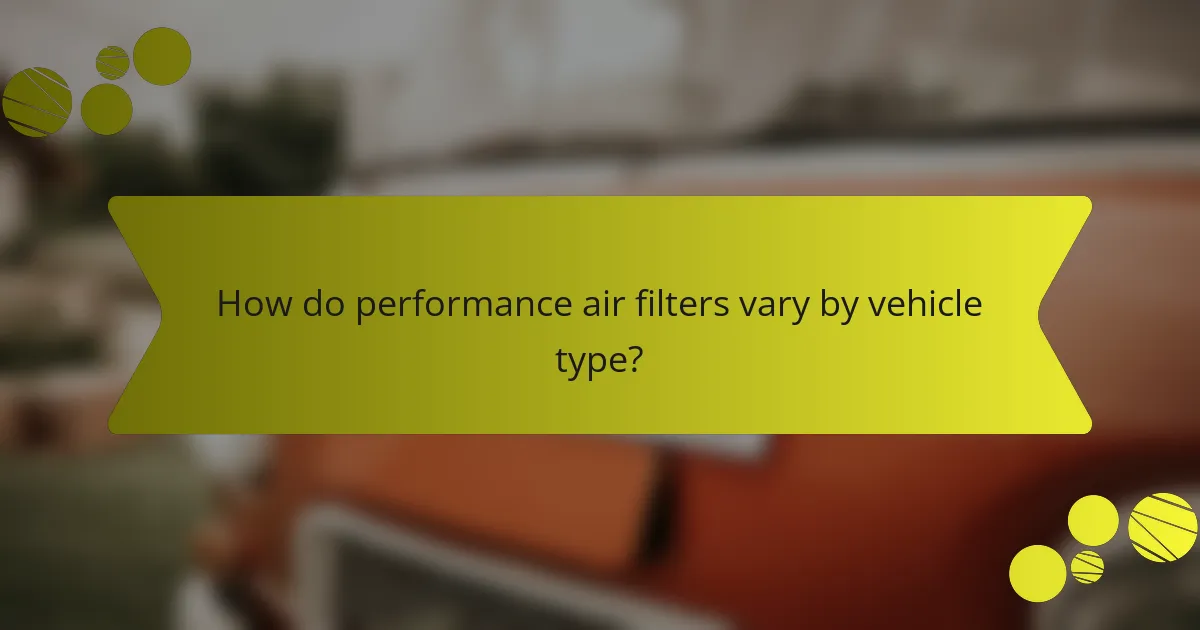
How do performance air filters vary by vehicle type?
Performance air filters vary by vehicle type primarily due to differences in engine specifications and airflow requirements. For example, high-performance sports cars benefit from filters designed for increased airflow, while standard sedans may use filters focused on filtration efficiency. Compatibility is crucial; filters must match the vehicle’s make and model to optimize performance. Additionally, some vehicles may require unique filter shapes or sizes, affecting installation and maintenance.
What considerations are there for performance air filters in sports cars?
Performance air filters enhance airflow and engine efficiency in sports cars, improving performance. Key considerations include filter material, maintenance frequency, and compatibility with the vehicle’s engine specifications.
Choosing the right filter material, such as cotton or foam, impacts filtration efficiency and airflow. Regular maintenance ensures optimal performance; manufacturers often recommend cleaning or replacing filters every 10,000 to 30,000 miles. Compatibility with the vehicle’s engine and air intake system is crucial to avoid performance issues.
Performance air filters can also influence engine sound, providing a sportier exhaust note. Some filters may feature unique attributes like oil-free designs, which reduce maintenance needs.
How do off-road vehicles benefit from specialized performance air filters?
Off-road vehicles benefit from specialized performance air filters by enhancing engine efficiency and improving airflow. These filters capture more dirt and debris, which is crucial in rugged terrains. As a result, vehicles experience increased horsepower and better fuel economy. Performance air filters are designed to withstand extreme conditions, offering superior filtration compared to standard options. Regular maintenance of these filters ensures optimal performance and longevity, making them essential for off-road enthusiasts.

What unique features should you look for in performance air filters?
Look for features like filtration efficiency, airflow capacity, and material durability in performance air filters. High filtration efficiency ensures maximum dirt and particulate capture, while optimal airflow capacity enhances engine performance. Durable materials resist wear, extending filter life. Additionally, consider the filter’s compatibility with your vehicle to ensure proper installation and function.
How does filter material affect performance and longevity?
Filter material significantly impacts performance and longevity by determining airflow, filtration efficiency, and maintenance frequency. High-quality materials enhance engine efficiency, leading to better fuel economy. For example, synthetic filters often last longer than paper filters, reducing replacement frequency. Choosing the right filter material ensures optimal engine performance and lifespan.
What role does filter design play in airflow efficiency?
Filter design significantly enhances airflow efficiency by optimizing resistance and maximizing air passage. A well-designed filter minimizes airflow obstruction, allowing systems to operate effectively. Key attributes include filter material, thickness, and surface area, all influencing performance. For instance, high-efficiency particulate air (HEPA) filters capture smaller particles while maintaining airflow. Regular maintenance ensures filters remain effective, preventing buildup that can hinder airflow. Compatibility with specific systems is crucial, as improper filters can reduce efficiency and increase energy consumption.
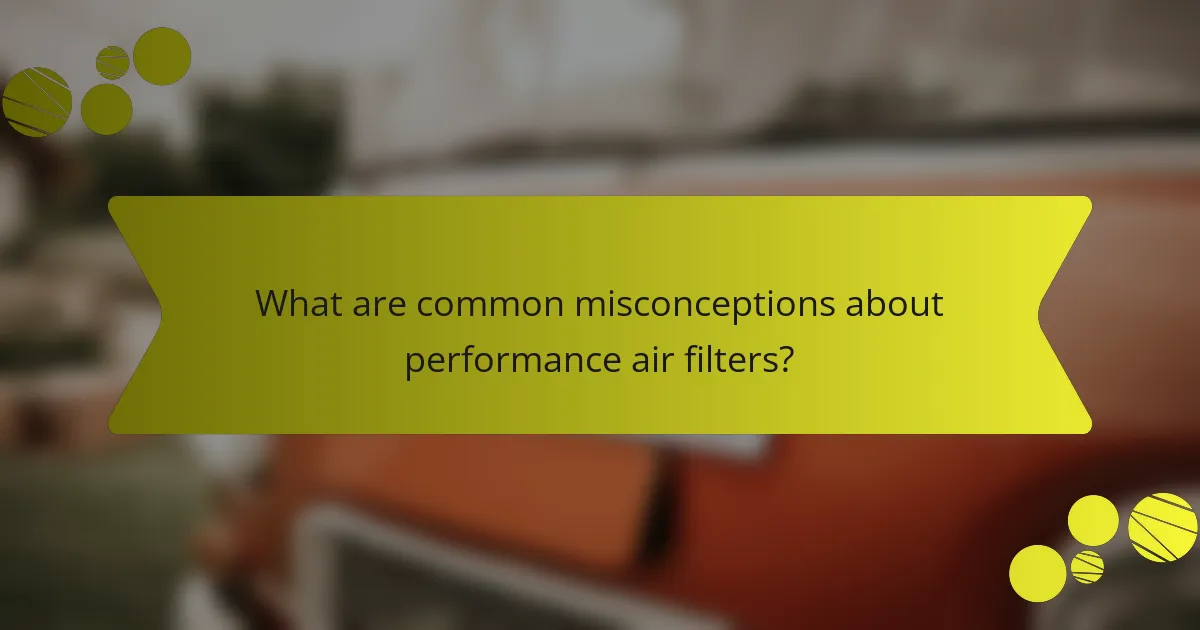
What are common misconceptions about performance air filters?
Many misconceptions exist about performance air filters. A common belief is that they are only for racing enthusiasts, but they can enhance everyday vehicle performance. Some think performance air filters require constant replacement, yet they often last longer than standard filters. Another myth is that they significantly increase fuel consumption, while in reality, they can improve fuel efficiency by optimizing airflow. Lastly, some assume all performance air filters are the same; however, compatibility with specific vehicle models is crucial for effectiveness.
Do performance air filters really improve horsepower?
Yes, performance air filters can improve horsepower, but the extent varies by vehicle. They enhance airflow, which can lead to better engine efficiency and increased power output. Studies show that some filters may provide a horsepower increase of 5 to 10 percent under optimal conditions. However, results depend on factors like engine type, tuning, and overall vehicle design. Regular maintenance is crucial to ensure these filters perform effectively over time.
Can performance air filters damage your engine?
Performance air filters generally do not damage your engine if installed correctly. However, poor installation or incorrect filter selection can lead to issues. High-flow filters may allow more dirt into the engine if not designed properly, potentially causing wear. Regular maintenance ensures optimal performance and engine protection. Always choose compatible filters for your vehicle model to avoid complications.
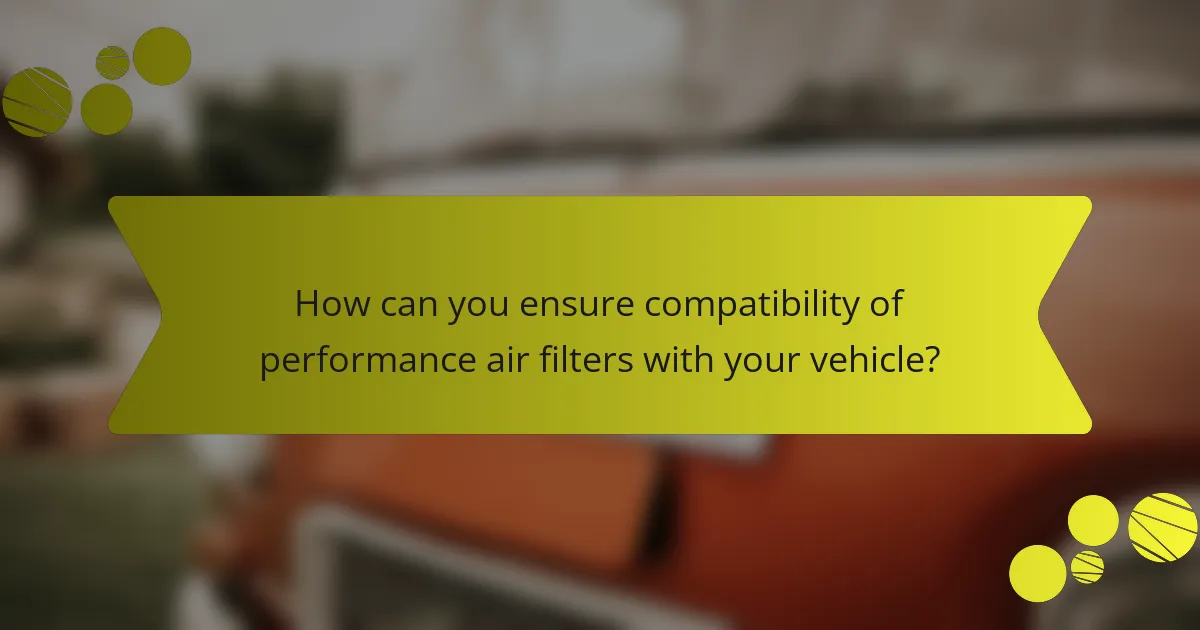
How can you ensure compatibility of performance air filters with your vehicle?
To ensure compatibility of performance air filters with your vehicle, check the manufacturer’s specifications. Verify the filter’s dimensions, shape, and attachment method to match your vehicle’s intake system. Additionally, consider the engine type and any modifications made. Using filters designed for your specific make and model enhances performance and efficiency.
What factors determine the correct fit for performance air filters?
The correct fit for performance air filters depends on several factors. Key considerations include the vehicle’s make and model, engine specifications, filter dimensions, and airflow requirements. Compatibility with the existing air intake system is crucial to ensure optimal performance. Additionally, the filter’s filtration efficiency and material type can affect overall engine performance and longevity. Selecting a filter that matches these attributes will enhance engine efficiency and improve air quality.
How to identify the right performance air filter for your specific make and model?
To identify the right performance air filter for your specific make and model, check compatibility with your vehicle’s specifications. Start by consulting your owner’s manual for recommended filter types. Consider attributes such as filter size, shape, and airflow characteristics. Research brands known for quality performance filters tailored to your vehicle. Additionally, read customer reviews to gauge real-world performance and satisfaction.
What tools do you need for installing a performance air filter?
To install a performance air filter, you need basic tools like a screwdriver, socket wrench, and pliers. These tools help remove the old filter and secure the new one properly. Ensure you have a clean workspace for efficient installation.
What are the best practices for optimizing performance air filter use?
To optimize performance air filter use, follow these best practices: regularly check filter condition, replace filters based on manufacturer recommendations, ensure proper installation, and select filters compatible with your vehicle’s specifications. Regular maintenance enhances airflow and engine efficiency. Using high-quality filters can improve filtration and performance.
